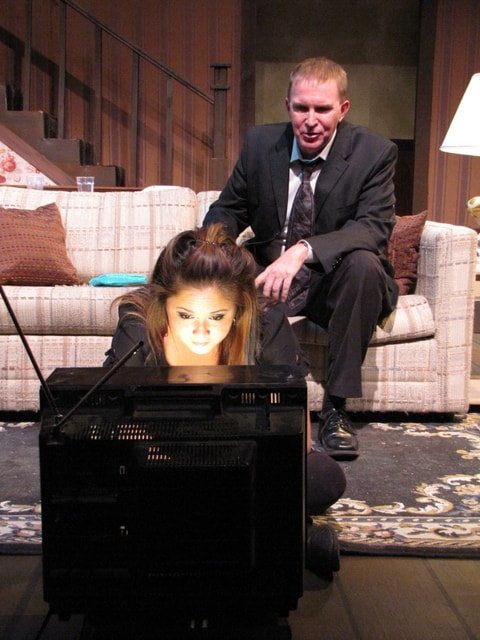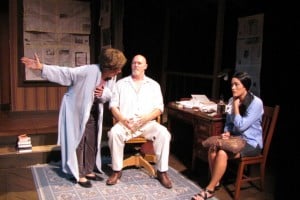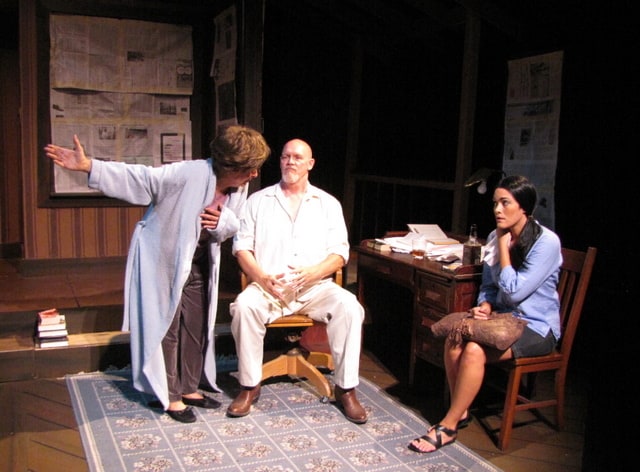
When one attends a Pulitzer Prize winning play, one naturally will have preconceived notions of what to expect. It will often be esoteric, if not downright inaccessible, reeking with an overweening sense of self-importance. Thankfully, such is definitely not the case when it comes to Tracy Lett’s utterly brilliant August: Osage County. And it’s hard to imagine a better production than this magnificent, stunning season debut from City Lights Theater Company.
It’s not as if this darkly comic, often hysterically funny examination of a malignant American family is visiting an uncharted landscape. Edward Albee and Eugene O’Neill have successfully explored much the same territory, but there’s a certain literary pretense to their style that’s just about non-existent here. And although their masterworks (Virginia Woolf, Long Day’s Journey, etc.) are noted for their timelessness, there’s an immediacy to this tragicomedy (set in 1997) that is perhaps more fresh and relevant to today’s audience.
The premise is simple: Beverly Weston, husband to Violet and father to three daughters has gone missing, so the entire clan reunites at their parents’ Oklahoma home to provide their grieving mother with emotional support. What ensues is a virtual train wreck as the lives of the sibling trio unravel before our very eyes. And yet, with each successive jaw-dropping disclosure, one can’t help but be transfixed by the vibrant characters and the undeniable truth and familiarity of their familial dysfunction.
The homecoming takes place in a cozy first floor living and dining room area (and attic) of a single set designed as a modest, multi-level middle class home carefully rendered without ostentation by Ron Casparinetti. Scene transitions are highlighted by subtle lighting changes by the always-reliable Michael Palumbo. And each of the three acts is introduced by original music by master sound designer George Psarras, featuring fine delta blues slide guitar solos by Paul Psarras.
Beverly appears only during the opening prologue, but his presence is felt throughout. And that’s attributable not only to the narrative, but to Michael J. West’s brief but indelible portrait of the hard drinking intellectual whose obsession with T.S. Eliot does not bode well for the future.

Lamenting his long marriage to Violet, a woman whose “cold-bloodedness is more than metaphorical,” Beverly hires a Native American housekeeper, Johnna Monevatta (imbued with sensitivity and grace by Alika Ulani Spencer), which turns out to be a final gesture of prophetic compassion. Despite being asked to recite quotes from Eliot’s fatalistic poem “The Hollow Men” – even once to the tune of a recurring children’s nursery rhyme – West’s grounded portrayal strikes just the right balance of wit, strength and a profound melancholy.
Violet Weston is undoubtedly the most fascinating, albeit diabolical, female personality conceived for the live theatre thus far this century. Not since Albee’s “Martha” in Who’s Afraid of Virginia Woolf has one witnessed such a compelling role. Of course, recognition must be given to the casting director (Amanda Folena) and the direction of Virginia Drake, but ultimately credit must be go to Lillian Bogovich for meeting the challenge and giving us an unforgettable, bravura performance that is nothing less than a revelation.
Violet is a woman in pain, both psychically and physically. She suffers from mouth cancer and yet smokes like a chimney. To dull her agony, she’s become addicted to prescription painkillers. She’s endured a traumatic upbringing and a life tied to an alcoholic spouse, and believes her sad existence gives her license to pass on the hostility and anguish to her progeny by exploiting their vulnerabilities and verbally assaulting them. She can rationalize tearing down those close to her by hiding behind the guise of “only speaking the truth.” And Ms. Bogovich revels in all of the inter-generational, matriarchal pathology, commanding the stage and remaining true and committed to her character without ever resorting to an over-the-top caricature. She is Violet Weston! Bravo!
If that were not enough, equally impressive is Diahanna Davidson as Barbara Weston, the eldest daughter who confronts her mother (and her mother’s substance abuse problem) head-on and finds herself in charge of the household – at least for the time being. Along the way she has to cope with a professor husband (an unflappable Rich Miller) who has left her for a much younger student, and a promiscuous, dope-smoking teen (a totally convincing Adrienne Walters) who’s receiving inappropriate attention from her sister Karen’s (Dana Zook) fiancé (a very creepy Ken Boswell)! In many ways her character arc is more pronounced and complex than Violet’s, and Ms. Davidson is more than up to the task, handling the melodrama with a dazzling passion and fearless abandon.
We’re introduced to Karen at the start of the second act as she assists Barbara in setting the dinner table. The scene involves a lengthy passage that shrewdly reveals all we need to know about the unhappy and somewhat delusional youngest child, and it’s delightfully played by the captivating Ms. Zook. Moreover, it features some prolonged and complicated staging that’s perfectly executed up to the very moment where the entire ensemble sits down to eat their meal. Indeed, it may very well be among the best such sequences one is likely to ever see.
As the middle child, Ivey (Lisa Mallette) is the only one still living close to home. Despite being Violet’s “favorite,” she’s often criticized by her mom for the (apparent) lack of a man in her life – and her appearance, e.g., “you look like a lesbian!” Sensitivity and political correctness are definitely not Violet’s strong suit. Ms. Mallette brings an understated maturity and depth to her less showy part that rings true and is quite affecting in its humanity.
Remarkably, the remaining cast all rise to the high bar set by Ms. Bogovich. There isn’t a weak link among them, including Jackie O’Keefe as Violet’s outspoken sister, Mattie Fae; Dan Roach as Charlie Aiken, Mattie’s affable husband; the versatile and chameleonic George Psarras as “Little Charlie,” Ivey’s shy cousin and secret love interest; and Damian Vega as the local sheriff and Barbara’s old high school flame.
It’s a testament to its vitality and entertainment excellence that this three hour, two intermission play just breezes by. The patrons on opening night stood in unison with thunderous applause. It was clearly a special and memorable occasion for all concerned. This is the very definition of a must-see event and worth a trip to downtown San Jose. Don’t miss it!
August: Osage County
City Lights Theater Company
5 out of 5 stars (Outstanding – Starkie!)
Directed by Virginia Drake
Written by Tracy Letts
September 22, 2011 through October 23, 2011
City Lights Theater
[Photos: Kit Wilder]



